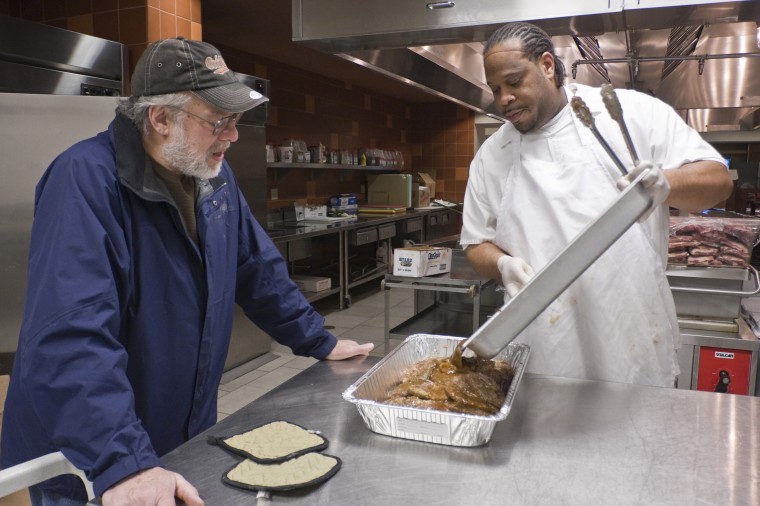Residences aim to reduce food waste
Food collector Andy Sofranko, left, watches Newman Hall cook Jermaine Cooper, right, prepare food for the St. Jude Soup Kitchen in Champaign on Tuesday, April 14.
Apr 15, 2009
Having to feed hundreds of people at a time, residence hall cooks are constantly making food in bulk.
Whether it’s public housing, private housing or a sorority or fraternity, all of these residences deal with trying to cook the exact amount of food so food waste is not a problem.
Luckily, with the ever-increasing “Go Green” attitude, many residence halls are beginning to be conscious of wastefulness and are working to decrease this problem.
Hendrick House, which serves approximately 350 students daily, recently redesigned its dining hall and has noticed dramatic decreases in its food waste.
Food Services Director Sue Dawson describes two kinds of waste.
Get The Daily Illini in your inbox!
One is food that students take and don’t eat.
Hendrick House noticed a dramatic decrease in this kind of waste due to the elimination of trays.
The second is food that is cooked and not eaten, which is what Hendrick House was originally aiming to reduce.
“They can’t carry as much food,” Dawson said. “They get a plate and if they want more they can go back. They are not loading up their trays with food they may or may not eat.”
Also, Hendrick House now has food cooked to order, so students are served exactly what they want and there isn’t a lot of leftover food.
What is leftover Dawson tries to either donate to local organizations or reuse in other meals throughout the week.
However, this is only done if the food is within proper sanitations standards. If not, the food must be thrown out.
Hendrick House was one the first to donate to local organization Champaign-Urbana Coalition for the Homeless, which then distributes food to local charities.
Newman Hall now donates to this organization as well.
“It’s a good way to help other people,” said Cliff Maduzia, president of Champaign-Urbana Coalition for the Homeless. “They are always thrilled to see whatever we bring them.”
Newman Hall donates about 500 pounds of food a week, Maduzia said.
Private certified housing is easier for the Coalition to pick up from since these dorms have to follow public health codes.
Public health codes cannot be enforced in University housing, although these dorms are subject to the University health codes, Maduzia said.
Due to sanitation codes, the Coalition cannot accept food that has been already out in the serving line.
However, it can collect food that is out of date. This is how the Coalition gets many donations from grocery stores, collecting 300 pounds of food from local IGA Supermakets a day.
Since donating to the hungry is a noble cause, yet no organization wants to have wasted food, Maduzia describes a tension between food service managers and donation organizations.
“If (dorms) have a lot of waste they are going to be scrutinized,” Maduzia said.
“You have to minimize waste and you don’t want to encourage waste, but you have to figure out ways to feed the hungry.”
Maduzia is aware of other food donation organizations in town that dorms, fraternities and sororities donate to, but he doesn’t describe it as a competition.
“I’m always trying to find out where there is waste that shouldn’t be waste,” Maduzia said. “That’s pretty much what it is all about.”






